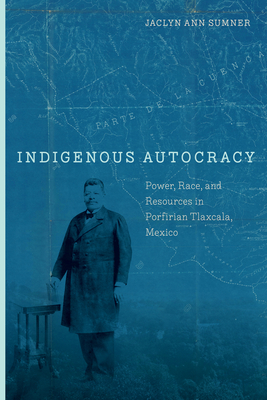Indigenous Autocracy: Power, Race, and Resources in Porfirian Tlaxcala, Mexico

Indigenous Autocracy: Power, Race, and Resources in Porfirian Tlaxcala, Mexico
When General Porfirio Díaz assumed power in 1876, he ushered in Mexico's first prolonged period of political stability and national economic growth--though "progress" came at the cost of democracy. Indigenous Autocracy presents a new story about how regional actors negotiated between national authoritarian rule and local circumstances by explaining how an Indigenous person held state-level power in Mexico during the thirty-five-year dictatorship that preceded the Mexican Revolution (the Porfiriato), and the apogee of scientific racism across Latin America.
Although he was one of few recognizably Indigenous persons in office, Próspero Cahuantzi of Tlaxcala kept his position (1885-1911) longer than any other gubernatorial appointee under Porfirio Díaz's transformative but highly oppressive dictatorship (1876-1911). Cahuantzi leveraged his identity and his region's Indigenous heritage to ingratiate himself to Díaz and other nation-building elites. Locally, Cahuantzi navigated between national directives aimed at modernizing Mexico, often at the expense of the impoverished rural majority, and strategic management of Tlaxcala's natural resources--in particular, balancing growing industrial demand for water with the needs of the local population. Jaclyn Ann Sumner shows how this intermediary actor brokered national expectations and local conditions to maintain state power, challenging the idea that governors during the Porfirian dictatorship were little more than provincial stewards who repressed dissent. Drawing upon documentation from more than a dozen Mexican archives, the book brings Porfirian-era Mexico into critical conversations about race and environmental politics in Latin America.
PRP: 294.50 Lei
Acesta este Prețul Recomandat de Producător. Prețul de vânzare al produsului este afișat mai jos.
235.60Lei
235.60Lei
294.50 LeiLivrare in 2-4 saptamani
Descrierea produsului
When General Porfirio Díaz assumed power in 1876, he ushered in Mexico's first prolonged period of political stability and national economic growth--though "progress" came at the cost of democracy. Indigenous Autocracy presents a new story about how regional actors negotiated between national authoritarian rule and local circumstances by explaining how an Indigenous person held state-level power in Mexico during the thirty-five-year dictatorship that preceded the Mexican Revolution (the Porfiriato), and the apogee of scientific racism across Latin America.
Although he was one of few recognizably Indigenous persons in office, Próspero Cahuantzi of Tlaxcala kept his position (1885-1911) longer than any other gubernatorial appointee under Porfirio Díaz's transformative but highly oppressive dictatorship (1876-1911). Cahuantzi leveraged his identity and his region's Indigenous heritage to ingratiate himself to Díaz and other nation-building elites. Locally, Cahuantzi navigated between national directives aimed at modernizing Mexico, often at the expense of the impoverished rural majority, and strategic management of Tlaxcala's natural resources--in particular, balancing growing industrial demand for water with the needs of the local population. Jaclyn Ann Sumner shows how this intermediary actor brokered national expectations and local conditions to maintain state power, challenging the idea that governors during the Porfirian dictatorship were little more than provincial stewards who repressed dissent. Drawing upon documentation from more than a dozen Mexican archives, the book brings Porfirian-era Mexico into critical conversations about race and environmental politics in Latin America.
Detaliile produsului










